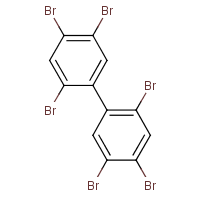2,4,5,2',4',5'-Hexabromobiphenyl
Agent Name
2,4,5,2',4',5'-Hexabromobiphenyl
CAS Number
59080-40-9
Formula
C12-H4-Br6
Major Category
Plastics & Rubber

Synonyms
1,1'-Biphenyl, 2,2',4,4',5,5'-hexabromo-; 2,2',4,4',5,5'-Hexabromobiphenyl; 2,2',4,4',5,5'-Hexabromo-1,1'-biphenyl; Hexabromobiphenyl; [ChemIDplus]
Category
Other Plasticizers
Description
White solid; [HSDB]
Sources/Uses
Used as a fire retardant for ABS plastics, coatings, lacquers, and polyurethane foams; Hexabromobiphenyl is resistant to degradation in the environment. It was a major constituent of Firemaster BP-6 and Firemaster FF-1 used in plastic components in televisions and computers. Commercial production and use ceased in the US in 1974; [HSDB]
Comments
No increased cancer deaths were found in a group of 3500 workers exposed to polybrominated biphenyls from 1935 to 1976 in a chemical plant. Cattle feed was contaminated with hexabromobiphenyl in 1973; it was used by farmer in Michigan from 1973-1974. Polybrominated biphenyls are possibly carcinogenic to humans (Group 2B). [IARC] Evidence of hepatotoxicity, neuromuscular dysfunction, reproductive toxicity, and liver tumors in high-dose animal studies; [HSDB] PBBs can cause chloracne and liver toxicity to workers exposed to high doses absorbed through the skin or by inhalation. [ATSDR ToxFAQs] See "Polybrominated biphenyls."
Biomedical References
Exposure Assessment
Bioaccumulates
Yes
Vapor Pressure
5.2E-08 mm Hg
Half Life
Biological half-life in guinea pigs = 22 days; Estimated body burden t1/2 in man = 6.5 years; [HSDB]
Adverse Effects
Hepatotoxin
Hepatoxic (a) from occupational exposure (secondary effect) or (b) in animal studies or in humans after ingestion
Reproductive Toxin
Yes
Dermatotoxin
Chloracne
IARC Carcinogen
Possible (2b)
Diseases, Processes, and Activities Linked to This Agent
Diseases
Occupational diseases associated with exposure to this agent:
Processes
Industrial Processes with risk of exposure: